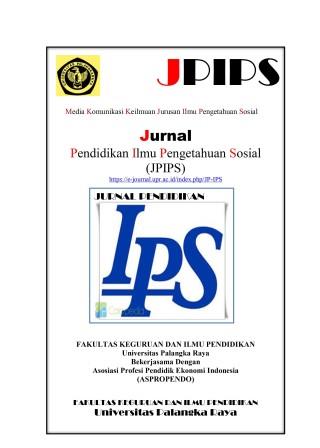The Function of Politeness of Teacher Language In Implementing Character Values To The Primary School Students
DOI:
https://doi.org/10.37304/jpips.v14i1.4740Keywords:
pragmatics, politeness, teacher language, character values, primary schoolAbstract
This research aims to identify the function of the language politeness of the teacher in implanting character values to students in the primary school. The research was carried out at the primary school of SD Muhammadiyah Pahandut, Kota Palangka Raya. A qualitative method was used in this research with a pragmatics research design. The pragmatics design used to analyze the data was based on the principle of politeness which included six maxims and five components of speech situation. The data were obtained from conversational discourse between teachers and students containing language politeness in teaching and learning activities at the school. Then the data were also supported by doing interviews with involved teachers and by reviewing assessment report documents of students to relate the function of the teacher's language politeness with student character values of being attained. The data obtained using the triangulation technique were analyzed and presented by the qualitative descriptive technique. The results showed that there were 150 items of teacher language politeness which provided very good functions in implanting character values to students as an effort to build character for primary school students
Downloads
References
Ali, M. (2010). Filsafat Pendidikan Muhammadiyah, dalam http: //www. eprints.ums.ac.id/64/1/Moh.Ali.doc. Diakses tanggal 24 April 2010.
Brown, P. (2015). Politeness and Language. International Encyclopedia of the Social & Behavioral Sciences, 18(2), 326-330. DOI. https://doi.org/10.1016/B978-0-08-097086-8.53072-4
Dikti. (2007). Permendiknas Nomor 16 Tahun 2007: Tentang Standar Kualifikasi Akademik dan Kompetensi Guru. Jakarta: Kemendiknas.
Duhita, A.A., dan Zulaeha, I. (2018). The Politeness Speech of Primary School Teacher in the Character Building of Learners. Jurnal Seloka: Jurnal Pendidikan Bahasa dan Sastra Indonesia, 7(2), 112-121. DOI https://doi.org/10.15294/seloka.v7i2.25182
Grice, H. Paul. (1975). “Logic and Conversation” dalam Davis S. (ed.) Pragmatics: A Reader. New York: Oxford University Press.
Gunarwan, A. (2002). Pedoman Penelitian Pemakaian Bahasa. Jakarta: Pusat Bahasa.
González, N.M.R, dan Martín, A.M.R. (2015). The Teaching of Politeness in the Spanish-as-a-foreign-language (SFL) Classroom. Procedia-Social and Behavioral Sciences, Vol. 178, 196-200. https://doi.org/10.1016/j.sbspro.2015.03.180
Leech, G. (1983). Principles of Pragmatics. London: Longman.
Meier, A.J. (2016). Teaching the Universal of Politeness. English Language Teaching (ELT) Journals, 51(1), 21-28. ELT Journal | Oxford Academic (oup.com)
Mendikbud. (2018). Permendikbud Nomor 37 Tahun 2018: Perubahan Atas Peraturan Menteri Pendidikan dan Kebudayaan Nomor 24 Tahun 2016 Tentang Kompetensi Inti dan Kompetensi Dasar Pelajaran pada Kurikulum 2013 pada Pendidikan Dasar dan Pendidikan Menengah. Jakarta: Kemendikbud.
Mahmud, M. (2019). The Use of Politeness Strategies in the Classroom Context by English University Students. Indonesian Journal of Applied Linguistics, 8(3), 597-606. https://doi.org/10.17509/ijal.v8i3.15258
Mardiana, D. (2021). Keefektifan Model Pembelajaran Daring Berbasis Kekooperatifan dan Kesantunan Berbahasa dalam Perkuliahan Bahasa Indonesia. Jurnal Bahasa, Sastra dan Pembelajarannya (JBSP),11(1), 149-175 DOI: 10.20527/jbsp.v11i1.10569
Puskumbuk, Balitbang Kemendiknas. (2011). Pedoman Pelaksanaan Pendidikan Karakter. Jakarta: Kemendiknas.
Prayitno, H.J, Ngalim, A., Sutopo, A., Rohmadi, M., dan Yuniawan, T. (2018). Power, Orientation, and Strategy of Positive Politeness Used by Children at the Age of Elementary School with Javanese Cultural Background. Jurnal Humanus, 17(2), 164-173. DOI: 10.24036/humanus.v17i2.101371 URL: http://dx.doi.org/10.24036/humanus.v17i2.101371
Rustono. (1999). Pokok-pokok Pragmatik. Semarang: IKIP Semarang Press.
Stubbs, M. (1983). Discourse Analysis: The Sociolinguistic Analysis of Natural Language. London: Basil Blackwell. Oxford.
Sugiyono. (2012). Metode Penelitian Pendidikan: Pendekatan Kuantitatif, Kualitatif, dan R&D. Bandung: Alfabeta.
Syahri, I. (2013). Resemblance of Indirectness in Politeness of EFL Learners’ Request Realizations. Indonesian Journal of Applied Linguistics (IJAL) 3(1), 148-165. DOI: https://doi.org/10.17509/ijal.v3i1.197
Ta, K.H., dan Farashaiyan, A. (2012). The Effectiveness of Teaching Formulaic Politeness Strategies in Making Request to Undergraduates in an ESL Classroom. Asian Social Science, 8(11), 189-196. DOI: https://doi.org.10.5539/ass.v8n15p189














